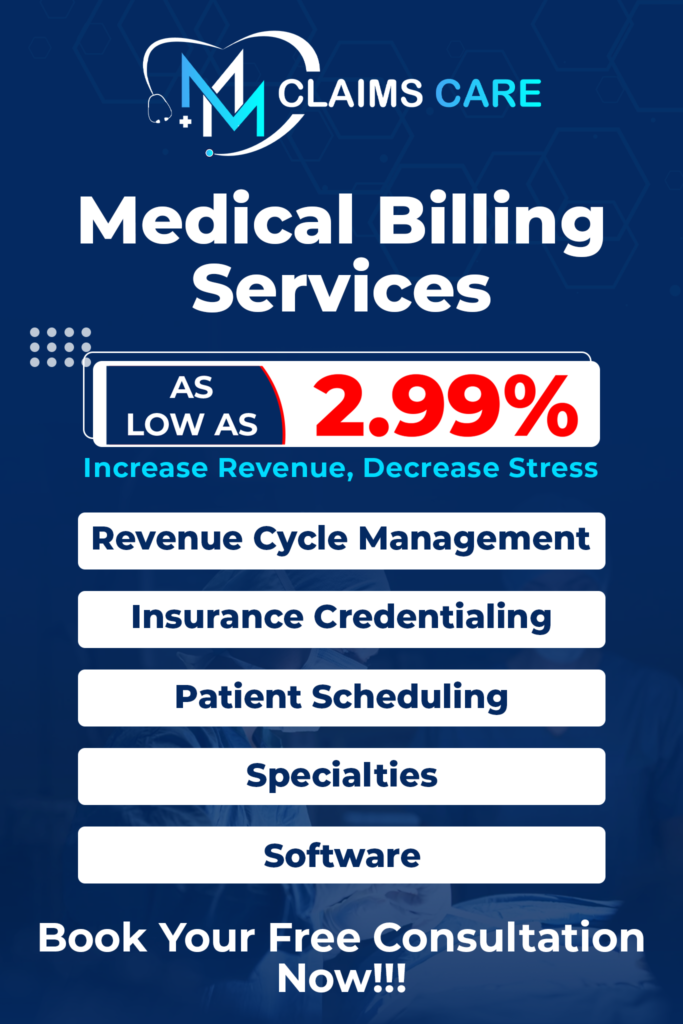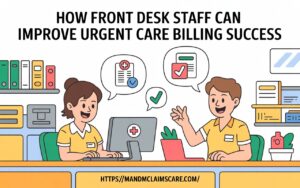Revenue cycle management is the building block for healthcare practice. When this one component is strong and steady, then everything runs smoothly from patient intake to final payment. But this cycle can also cause claims to be denied, different cash flow issues, and headaches you didn’t sign up for, if not managed properly. To manage the revenue cycle, it is important to first understand it completely. Whether you’re a physician, clinic manager, or healthcare admin trying to understand billing complexities, this guide’s for you. Let’s discuss RCM in medical billing, why it matters, and how to make it work better for your practice.
What Is Revenue Cycle Management (RCM)?
RCM is the process of tracking and managing a patient’s financial journey through your practice from that first appointment to the final bill being paid. It’s like the behind-the-scenes system that connects clinical care to financial outcomes. Different aspects are included in the Revenue cycle management cycle in medical billing, including:
- Patient registration and insurance verification
- Charge capture and coding
- Claim submission
- Payment posting
- Denials and appeals
- Patient collections
- Reporting and analytics
All these steps are necessary to make sure you get paid for the care you’ve provided. Without a solid RCM process, you face losses, and in healthcare, you can’t afford it.
Why RCM Matters More Than Ever
Managing healthcare practice is not an easy task due to shifting payer rules, changing regulations, and high patient expectations. That’s why healthcare is getting more complex every year. Here, RCM is the only function that ensures each process of patient treatment is managed efficiently. It becomes a necessary part of each medical billing company for various reasons:
Fewer Claim Denials
Clean claims mean faster payments. With solid RCM, you find coding errors or eligibility issues before they reach the payer’s inbox. Having a denial rate below 8% means efficient revenue management.
Better Cash Flow
When your billing process is efficient, payments also come in faster. That means fewer gaps between providing care and seeing the money.
Improved Patient Experience
Accurate upfront cost estimates and easier billing communication can directly impact the patient satisfaction rate, which boosts their trust in your practice.
Regulatory Compliance
Efficient RCM in medical billing services also helps you stay in line with HIPAA, MACRA, and other regulatory organizations’ regulations.
The 8 Key Steps in the RCM Process
RCM in billing is not the name of a single entity to manage instead different stages are included:
Pre-Registration and Insurance Verification
This step happens before a patient even walks through your practice. It’s all about collecting the right data upfront like demographics, insurance info, referral details—and confirming that the patient’s insurance covers the scheduled service. The best thing here is to use real-time insurance eligibility tools to avoid surprises at the front desk.
Patient Registration
Once the patient arrives, their information is confirmed and entered into your system. This includes updating any missing details and making sure everything’s accurate.
Why does it matter? Even a typo in a birth date or policy number can lead to a denied claim. Double-checking now saves you from hassle later.
Charge Capture
After the visit, the provider documents the services performed. This documentation is translated into billable codes like CPT, ICD-10, and HCPCS that represent what was done and why.
If documentation is sloppy or incomplete, your billing department might undercharge or the claim could be rejected.
Medical Coding
Coders take the clinical documentation and assign the proper codes. These codes require accuracy because incorrect codes are one of the top reasons claims get denied. That’s why coding errors account for nearly 30% of claim rejections in some specialties.
Claim Submission
Once charges are coded, claims are compiled and sent to the payer (insurance company, Medicare, Medicaid, etc.). This is usually done electronically using an EDI (Electronic Data Interchange) system. Your claims should be clean and free from errors and complete with all required data. That’s what gets you paid faster.
Payment Posting
After the claim is reviewed and processed by the payer, you’ll receive an ERA (Electronic Remittance Advice) or EOB (Explanation of Benefits). Payments get posted to the patient’s account and any remaining balances are noted. If something seems off like a lower payment than expected then you need to investigate immediately.
Denial Management and Appeals
It is a reality that not every claim gets approved the first time. But a strong RCM team doesn’t give up—they review denials, identify root causes, and submit appeals where needed. The goal is to prevent future denials and recoup as much revenue as possible.
Patient Collections
Once insurance pays its portion, any remaining balance falls to the patient. Clear communication, flexible payment options, and timely follow-up make a big difference in collecting that final piece of the pie.
The Hidden Challenges of RCM
Each practice wants an efficient RCM process but different challenges make this difficult. These challenges include:
Keeping Up with Changing Payer Rules
Insurance companies prefer changing the rules and staying updated is a full-time job. Missing anyone and you could be looking at rejected claims for weeks. To fix this issue try to use billing software that’s updated in real-time and has a billing team that keeps tabs on payer updates.
Coding Errors and Documentation Gaps
If providers aren’t documenting thoroughly then coders can’t do their job. And if coders make mistakes then claims get rejected. It’s a domino effect. So you need to Invest in ongoing training for both providers and coders. Use auditing tools to find errors early.
Inefficient Workflow or Outdated Software
If your RCM system feels like it’s stuck in 2005 then you’re wasting time, missing revenue, or both. Now in this era of technology, you need to upgrade to cloud-based RCM solutions that offer automation, reporting, and real-time dashboards.
Lack of Transparency
When patients don’t understand their bills or what they owe then it leads to frustration and slow payments. To make this transparent you need to provide cost estimates upfront, use simple language on bills, and offer multiple ways to pay.
Technology’s Role in Modern RCM
Now the edge in today’s healthcare is having access to technology. Things get more simple with the help of the right technology. Now the efficient RCM process depends on automation, analytics, and AI. Now different tools and features are available including:
- AI-powered coding assistants
- Real-time eligibility verification
- Automated claims scrubbing
- Patient billing portals
- Denial trend dashboards
All these tools help your practice to face fewer errors, faster payments, and more time to focus on patient care.
In-House vs. Outsourced RCM: What’s Best?
This is one of the most common questions providers face: Should you manage RCM in-house or outsource it? Both have good and bad points as well. You have to choose the one according to your needs and preferences.
In-House RCM
- Full control over the process
- Requires hiring/training staff
- Upfront costs for software & salaries
- Best if you have volume & a strong admin team
Outsourced RCM
- Less oversight but more time for clinical focus
- Access to specialized experts
- Pay per claim or as a percentage of collections
- Best if you’re short-staffed or scaling fast
Many practices start in-house and shift to outsourcing as they grow. Outsourcing is the best option as you get access to experienced medical billing teams who know the complexities of RCM. If you want the best outsourced medical billing company, then M&M Claims Care is your best choice. We are an experienced medical billing company that has served various specialties, including family practice billing, mental health billing, chiropractic billing, , acupuncture billing services and many more, for years. We help you to make your RCM processes more streamlined and efficient.







